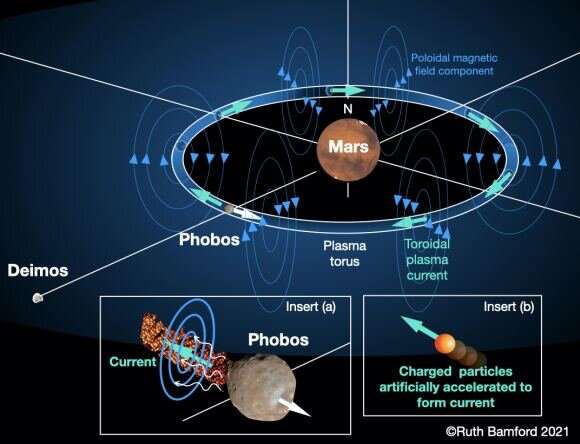An absolutely bonkers plan to give Mars an artificial magnetosphere

Terraforming Mars is one of the great dreams of humanity. Mars has a lot going for it. Its day is about the same length as Earth's, it has plenty of frozen water just under its surface, and it likely could be given a reasonably breathable atmosphere in time. But one of the things it lacks is a strong magnetic field. So if we want to make Mars a second Earth, we'll have to give it an artificial one.
The reason magnetic fields are so important is that they shield a planet from solar wind and ionizing particles. Earth's magnetic field prevents most high-energy charged particles from reaching the surface. Instead, they are deflected from Earth, keeping us safe. The magnetic field also prevents solar winds from stripping Earth's atmosphere over time. Early Mars had a thick, water-rich atmosphere, but it was gradually depleted without the protection of a strong magnetic field.
Unfortunately, we can't just recreate Earth's magnetic field on Mars. Our field is generated by a dynamo effect in Earth's core, where the convection of iron alloys generates Earth's geomagnetic field. The interior of Mars is smaller and cooler, and we can't simply "start it up" to create a magnetic dynamo. But there are a few ways we can create an artificial magnetic field, as a recent study shows.
Ideas for generating a Martian magnetic field have been proposed before, and usually involve either ground-based or orbital solenoids that create some basic level of magnetic protection. In the TV series "The Expanse," you can see a couple of scenes where you catch a glimpse of them. While this latest study acknowledges that might work, it proposes an even better solution.
As the study points out, if you want a good planetary magnetic field, what you really need is a strong flow of charged particles, either within the planet or around the planet. Since the former isn't a great option for Mars, the team looks at the latter. It turns out you can create a ring of charged particles around Mars, thanks to its moon Phobos.
Phobos is the larger of the two Martian moons, and it orbits the planet quite closely—so closely that it makes a trip around Mars every eight hours. So the team proposes using Phobos by ionizing particles from its surface, then accelerating them so they create a plasma torus along the orbit of Phobos. This would create a magnetic field strong enough to protect a terraformed Mars.
It's a bold plan, and while it seems achievable, the engineering hurdles would be significant. But as the authors point out, this is the time for ideas. Start thinking about the problems we need to solve, and how we can solve them, so when humanity does reach Mars, we will be ready to put the best ideas to the test.
More information: R.A. Bamford et al, How to create an artificial magnetosphere for Mars, Acta Astronautica (2021). DOI: 10.1016/j.actaastro.2021.09.023
Journal information: Acta Astronautica
Provided by Universe Today




















